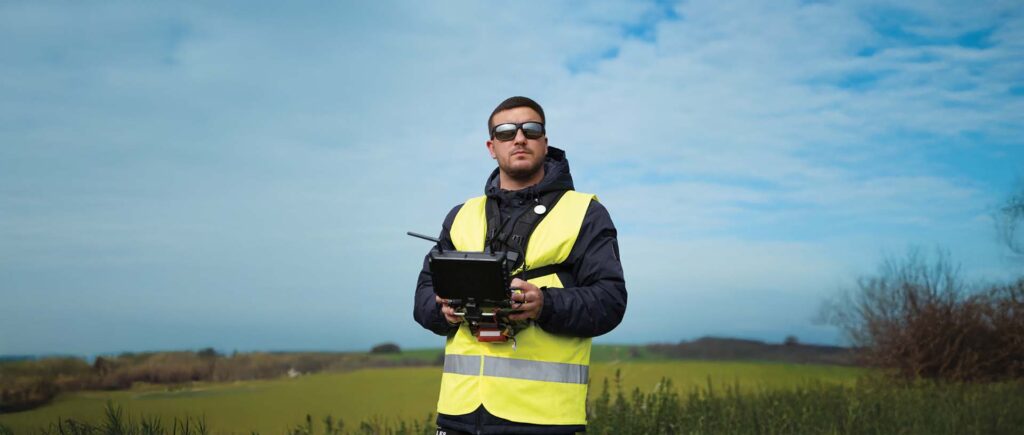
Want to become a professional drone pilot?
Professional Drone Pilot Course
Train at the best school to enter one of the most high-profile sectors, and obtain all the certificates you need to become a professional drone pilot
- 536 hours of in-person and online training in Madrid
- 40 hours of flight practice with real-world flight operations
- We give you your own professional drone equipment free of charge
- Morning and afternoon times
Upcoming calls
Become a professional drone pilot and find work in one of the most sought-after sectors through our comprehensive professional drone pilot course, where you can train in the different AESA-approved certificates to be able to fly your UAV safely and in line with all national and European standards.
17ª Promoción
1 de septiembre 2025.
Horarios de 09:30 – 13:30 horas.
COMPLETO
18ª Promoción
3 de noviembre 2025.
Horarios de 16:30 – 20:30 horas.
19ª Promoción
6 de abril 2026.
Horarios de 09:30 – 13:30 horas.

The most comprehensive and practical professional drone pilot course in the market
By taking the UMILES University professional drone pilot course, you will be entering the most comprehensive training in the market:
- A full theoretical and practical course to obtain professional training to fly all types of drone in different scenarios.
- Classes taught by experienced and active professionals with over 10 years of experience.
- 536 hours of mixed training divided into 3 full modules.
- In-person training in Madrid and in the field with practical sessions flying all types of drone in our own aerodrome.
- AESA-approved flight certificates endorsed by EASA.
- Specialisation in relevant sectors for drone flying, such as advanced mechanics, security, emergencies, and others.
- 40 hours of real-world operations in which students will have to plan, implement and resolve three real business operations for one of our clients.
- Course of professional drone handling so you can work in a sector with opportunities. You will become a true professional drone pilot.
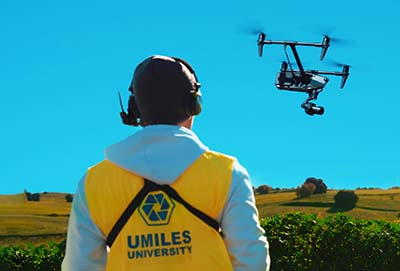
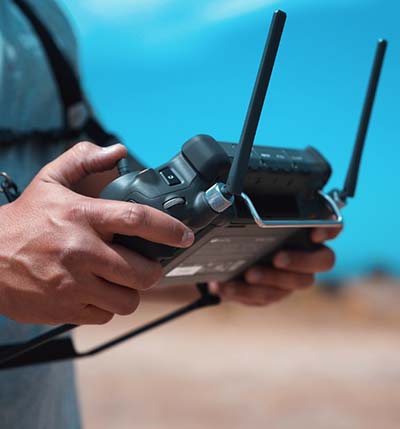
UNIVERSITY
Become a certified drone pilot
With UMILES University, you can take the most comprehensive official drone pilot course in the market, which is governed by AESA regulations, the highest national and international drone organisation. Therefore, on completing this training, you will be able to work as an operational drone pilot throughout Europe, with all the official certificates required for this purpose.

Drone applications are becoming more and more widespread, and having the certificates required to fly UAVs will give you access to an increasing number of new job opportunities.
With our approved STS drone pilot course, you will be able to obtain all the certificates required by the AESA (National Aviation Safety Agency) to safely pilot UAVs in different environments and in full compliance with the law.

Thanks to our training, you will be certified to work professionally in different areas of application where drones are used, such as in aerial filming, satellite image detection, crop inspections, and many others.

Want to work as a drone pilot? Call us on 91 113 89 88 and reserve your place now.
Why choose UMILES University?
UMILES University offers great national and international support, as we are an established drone operating company that is present in more than 12 countries worldwide.
We have extensive experience in the sector, and are therefore able to offer an advanced drone pilot course that provides you with validation as an expert in the different areas of interest related with UAV flying.
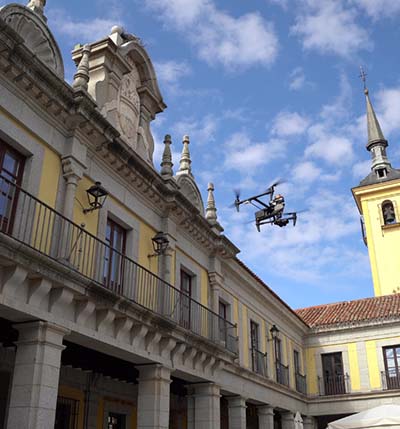
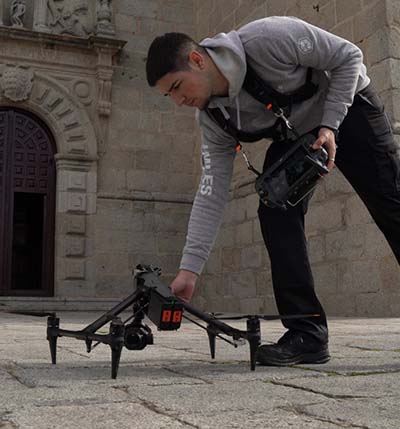
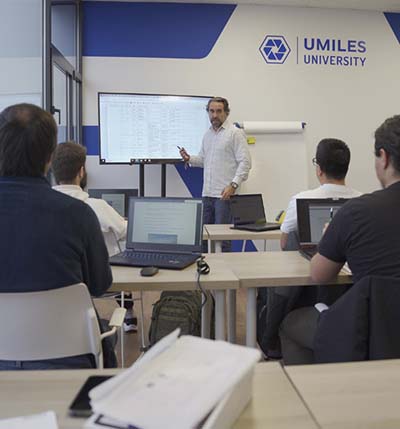
What do our alumni think?
Discover why we are the preferred choice for those looking to become certified and registered as professional drone operators in Spain.
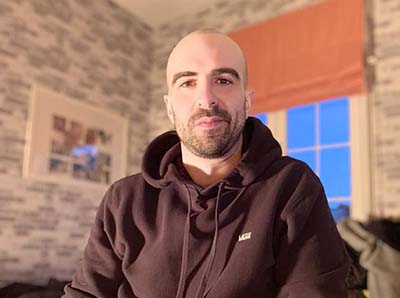
Daniel Elorza
Alumnus
«Enrolling in the UMILES Drone Pilot Master’s program was the best decision I have made since I got started in the world of drones.
The fact that the master’s is in-person and lasts an entire academic year allowed me to gain an in-depth understanding of this world and its various professional applications. It all comes with a good theory/practice balance, and best of all, it allowed me to meet people who share the same interest in drones as I do.»
7th graduating class
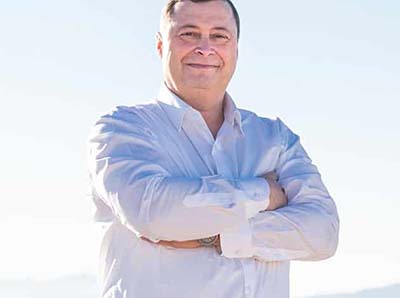
Ubaldo Nogal
Director of Electronics and Electricity, CRISALION
«I turned my hobby into my profession thanks to the UMILES PRO course, a company I later worked for for several years.»
1st graduating class
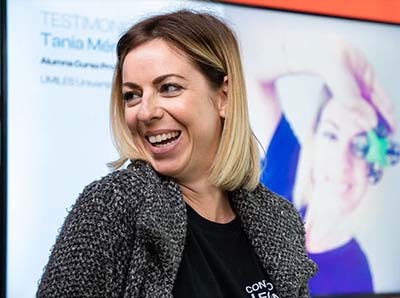
Tania Méndez
Alumna of the 5th graduating class of the Pro Course
«I was looking for a radical change in my professional profile and found at Umiles University the perfect combination of learning and hands-on practice in the technological drone sector.»
5th graduating class
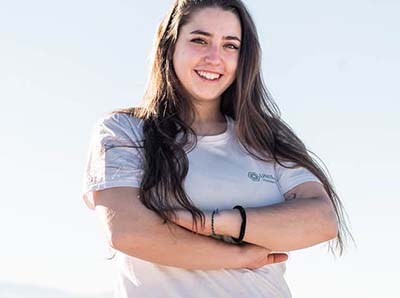
Gonzalo Seoane
Pilot at Fly Fut
«The teaching staff is as impressive as the large number of practical flight hours, which also simulate real-life situations.»
1st graduating class
Course content and organisation of the drone pilot course
Our professional drone pilot course is structured around 3 complete modules, covering all areas of interest in which a professional UAV operator must train in order to perform their duties safely and in line with regulations.
Below are the details of the contents of each module, with the most relevant aspects of this professional drone pilot course.
Module I – Flight certificates
This first module consists of 200 hours of training in which you will receive all the necessary certificates to operate officially and safely as a drone pilot. The content of this module is split into two main sections, subdivided as follows:
Part 1- European and Radio Operator Certificates
This section provides 124 hours of theoretical training for you to acquire all the necessary knowledge to technically operate drones, in order to obtain all the necessary certificates.
The course content for this module includes:
- 84 hours of information related with the operating of drones in line with the requirements of the National Aviation Safety Agency (AESA).
- 20 hours spent acquiring knowledge related with drone operating safety.
- 20 hours of training in communications, to be able to work as a radio operator.
Part 2- Practice sessions
The second part of Module I includes 76 hours of training aimed at enabling students to master flying with different types of drones.
The practical part of this module is divided as follows:
- Flight with 0-5kg drone: 4 hours of training in a theoretical-practical day + 20 hours of practical flying time at the aerodrome with exams included.
- Flight with 5-15kg drone: 4 hours of training in a theoretical-practical day + 20 hours of practical flying time at the aerodrome (exams included).
- Flight with 15-25kg drone: 4 hours of training in a theoretical-practical day + 10 hours of practical flying time at the aerodrome.
- Flight with fixed-wing drone: 4 hours of training in a theoretical-practical day + 10 hours of practical flying time at the aerodrome.
Module 2 – Professional specialisation
Once the general knowledge of drone operability has been acquired, the second module must be started, which includes all the necessary training for students to work in the different areas of professional drone activity.
This second module is subdivided into 4 sections covering the following course content:
Part 1 – Advanced Mechanics (AM)
This section provides students with all the mechanical knowledge needed to calibrate and make technical adjustments to the drone to adapt to each type of mission.
The course content for this section lasts for 80 hours of training spread over 4 weeks, including:
- Drone structure.
- Knowledge of installation, assembly, and engine, propeller, and variator components, etc.
- Drone programming.
- GPS settings.
- Flight controllers.
Part 2 – Industrial Technician and Remote Sensing (ITRS)
This section trains students in operating a drone professionally in all areas of work related with industrial and remote sensing applications.
It consists of 120 hours spread over 6 weeks, and includes the following:
- Types of UAS for civilian use.
- Use of satellite images.
- 3D planimetric surveying.
- Topography, thermal imaging, and cartography.
- Photogrammetry.
- Data analysis.
- Inspection of crops.
- Inspection of roads and infrastructure.
- Creation of flight paths with UgCS software.
- Pre-flight and post-flight reporting.
- Use of PIX4D and Agisolft Metashape for data collection.
- Techniques using RGB sensors.
Part 3 – Audiovisual Specialist Course (CEA)
Part 3 of this module aims to train the student in operating drones for commercial purposes, for advertising, filming scenes, and film making.
This segment includes 40 hours of training lasting for 2 weeks, and covers the following subjects:
- Organisation chart of the audiovisual sector.
- Creation of film script.
- Production.
- Types of cameras and components.
- Framing.
- Basic photographic production techniques.
- Photo and video shooting techniques.
- Advanced filming techniques.
- Storage of recordings.
- Editing and post-production.
Part 4 – Security and Emergency Course (SEM)
The last part of this module consists of 56 hours spread over 3 weeks, covering everything related with handling drones in the field of security and emergencies, especially for disaster work.
The course content for this section includes the following:
- History and evolution of drones.
- Uses of drones in security and emergencies.
- Real-life cases solved effectively with the use of drones.
- Anti-drone systems.
- Image taking for reporting.
- Security and emergency operational procedures.
- Operational flight plans.
- Remote surveillance.
- Design, planning and implementation of real-life operations.
- Practical flying sessions with drones specialising in emergency and rescue operations.
Module 3 – Real-world operations
The last module of our professional drone pilot course focuses on ensuring our students are trained to operate in any situation. 40 hours of training therefore involves a real-world operation of one of our UMILES clients.
At this point, students must be able to complete the following activities:
- Technical planning.
- Flight plan implementation.
- Selection of technical equipment.
- In-flight data collection.
- Processing of information.
- Preparation of the technical report.
This makes it the most comprehensive drone piloting course in the market, while including the possibility that the client might want to hire the student immediately for future work. This makes it an excellent opportunity to find work.

Apply now for your place
Don’t miss out on the chance to specialise as a professional drone pilot and gain access to a wide range of job offers from the industry’s leading companies. Ask for all the information you need to find out about the upcoming dates for our drone pilot course.
FAQs
Do you have any questions about our drone pilot course? Check out this list of FAQs, where we answer the most frequent questions.
Do I need a drone to take the course?
At UMILES, we provide all types of drones and the materials you will need during the practical sessions to ensure you learn to fly using UAVs of different capacities and motor specifications. So you don’t have to worry about owning a drone to register for our professional drone pilot course.
What are the requirements of the professional drone pilot course?
Given the limited number of places, we conduct a personal interview before each course to ensure the student’s commitment to the training course and check their availability to form part of our comprehensive professional drone pilot course, which includes all modules, certificates, material and hours of flight practice to receive training at the highest level and work as a professional drone operator throughout Europe.
How do you obtain the STS drone pilot license?
The training you receive on our professional drone pilot course will be more than enough for you to fly your UAV in any condition and sector.
Remember that this course gives you the necessary training and certificates to operate throughout Europe. So if you want to perform any activity that requires professional training for drone flying, all you have to do is register with the AESA and you can start operating immediately.
AESA will be the competent body responsible for issuing your theoretical certificate so that you can operate without restrictions.
How long does the STS drone pilot course last?
In our UMILES University drone pilot course, it takes around 6 to 7 months to complete the 3 modules. The course generally lasts for 536 hours spread over 27 weeks, including 200 hours for flight certificates, 296 hours for professional specialisation, and 40 hours of practical sessions in real-world operations (final module).
See all courses
At UMILES University we are experts in Drone Courses. Below you can see our training offer:
¹ Ejemplo de financiación para el Curso de Agricultura de Precisión. El precio financiando es de 1.810,00 €. El importe total del crédito simulado asciende a 1.089,00 €, con una cuota inicial de 610,00 € y 24 cuotas mensuales de 50€. El tipo de interés aplicado es del 8,5% (T.I.N.). La Tasa Anual Equivalente (TAE) para esta simulación es del 9,923%. El importe del curso al contado es de 1.699,00 €. Financiación sujeta a aprobación. Financiación ofrecida por el Sabadell Consumer Finance S.A.U., para obtener más información sobre las condiciones visite: https://umilesgroup.com/university/financiacion. Válido hasta el 30/06/2024. Este anuncio tiene fines exclusivamente informativos y no constituye una oferta contractual.